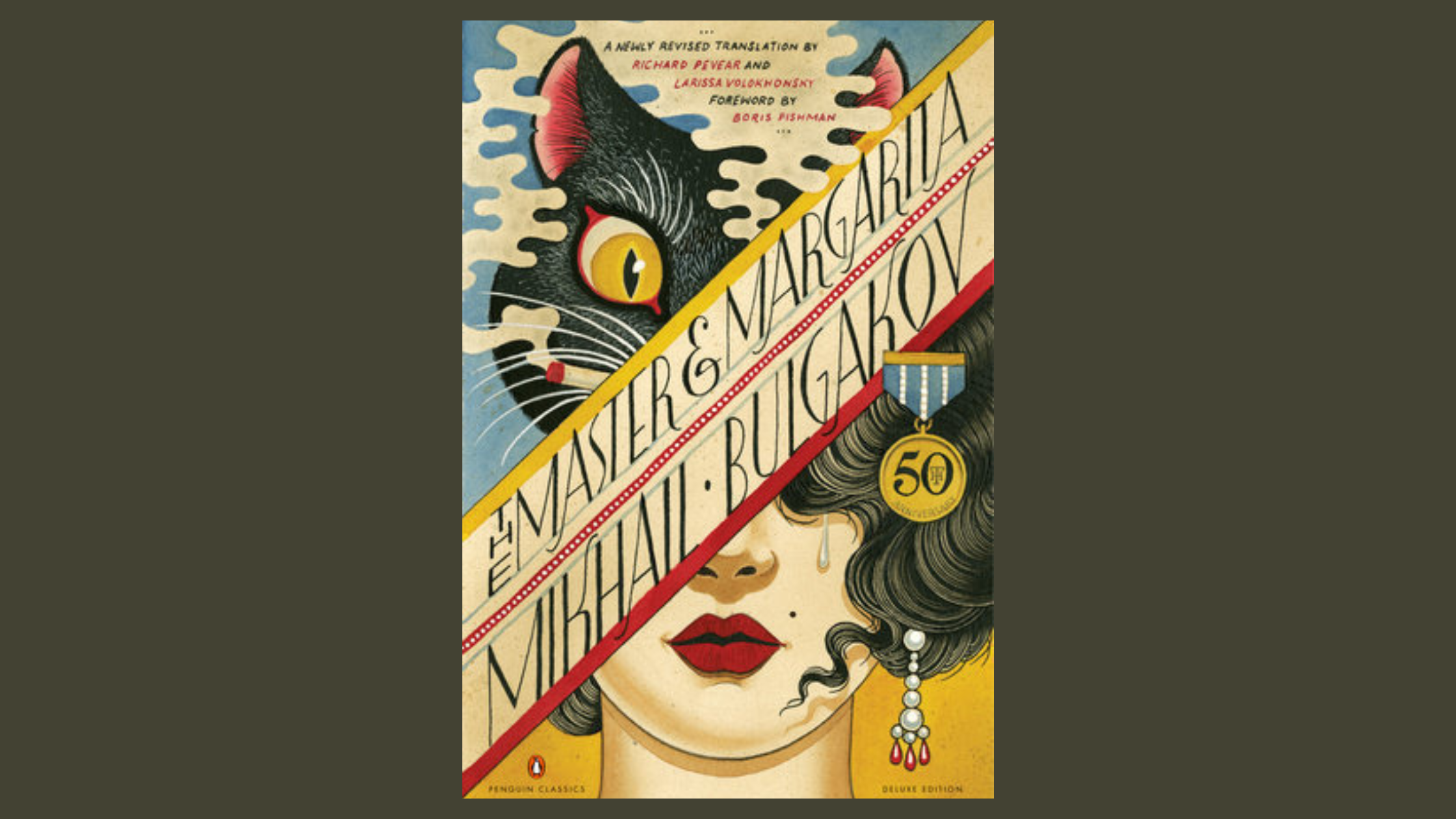The Master and Margarita
I didn’t think I was going to review The Master and Margarita by Mikhail Bulgakov. I didn’t think I was qualified to, but I spent a lot of time reading The Master and Margarita, and I want to talk about it, darn it! I don’t have to (and I’m not capable of) examining The Master and Margarita through the lens of critical theory. I’m not highfalutin enough for that nonsense, nor do I want to get intimate with Bulgakov’s allusions and symbols. Instead, here’s my hot take on a dark, complicated, and celebrated work of literature.
First, a bit about the book. As previously mentioned, it was written by Mikhail Bulgakov during Stalin’s regime. It deals heavily with Christianity. Some people think it’s a bit blasphemous, but Bulgakov also criticizes the Soviet Union’s official religion, atheism.
Aside from, you know, the purges and overall despair of living in the Soviet Union, Bulgakov’s also had a personal bone to pick with Stalin because his work was banned by the censors. To make matters worse, he also wasn’t allowed to leave the Soviet Union. In two heart-breaking letters he unsuccessfully pled his case to Stalin. But he started writing The Master and Margarita anyway, and then he burned it. After he got over his fear of writing such a dangerous book, he rewrote it and kept it hidden for the rest of his life. Soooo, heavy stuff, right? I think it’s important to know though because it makes the experience of reading The Master and Margarita richer. So much of Bulgakov’s mistreatment makes it into the book.
The Master and Margarita Summary
The Master and Margarita is a difficult book to summarize because there is so much going on. It is a conglomeration of subplots loosely tied together by Ivan Homeless, a poet who is admitted into an asylum after Woland (Satan) accurately predicts the decapitation of Homeless’s colleague.
The characters known as The Master and Margarita have little to do with the first half of the book. Instead, the first half focuses on Woland and the mischief he and his band of demons make. We don’t even meet Margarita until book two and find out that she is trapped in a loveless marriage but dreams of being with her paramour, a writer we only know as The Master. She makes a deal with Woland and book two follows her adventure as she transforms into Queen Margot, hostess of Satan’s Ball.
All this plus a novel within the novel dispersed throughout the book that tells the story of Jesus’s crucifixion through Pontius Pilate’s point of view. This sounds like a lot, and it is, but somehow The Master and Margarita eventually comes together.
Initially, I thought I loved The Master and Margarita. Upon further reflection I realized I loved that I finished The Master and Margarita and at least sort of understood it. It’s a complicated work of capital-l literature and I finished it. Of course my ego would want me to announce to the world that I loved it. Even if I’ve come to my senses and realized The Master and Margarita isn’t my favorite book ever, there were things I liked about it. Here are two of examples:
The Best Bits of The Master and Margarita
The Satire
I’m a sucker for satire and Bulgakov is particularly creative in the way he criticizes the Soviet Union. For example, Woland comes to Moscow as an artiste. He gets a gig at the Variety theater and his demons perform a black magic séance where money rains down on the audience and women are invited on stage to trade in their garments for more expensive ones. The audience takes the money but when they try to spend it after the séance, it turns into scraps of paper. The women who traded in their clothing leave the theater and find themselves naked on the streets of Moscow. This scene is both a funny and poignant way to criticize Soviet greed.
I’m also a sucker for poignant quotes. Early on Woland argues, “Yes, man is mortal, but that would be only half the trouble. The worst of it is that he’s sometimes unexpectedly mortal—there’s the trick!”
This quote so eloquently sums up the human condition. Woland’s specific argument at this point though is that if there is no God, who governs man? Homeless argues that man governs himself. Woland then asks how man can govern himself if he “cannot vouch for his own tomorrow.” This is part of Bulgakov’s criticism of Soviet atheism, which is a theme throughout the book, and the absurdity of trying to disprove the existence of God to Satan tickles me.
The Fantastical Plot
The Master and Margarita is often fun and surprising. In book two Azazello, a member of Woland’s posse gives Margarita cream to rub all over herself. She first applies it to her face and instantly appears younger. In a fit of glee, she rubs the cream over the rest of her body, and, before she knows it, she’s flying naked on a broom.
Margarita’s maid, seeing Margarita’s transformation, rubs the cream all over herself. She too levitates. Instead of flying on a broom, however, she rubs the lotion on a depraved male character who turns into a hog. The maid, also nude, flies off on her hog in maniacal bliss.
This whole chapter is ridiculous and entertaining and somehow both misplaced and right at home. The Master and Margarita is surprising in the way it mingles the biblical with the fantastical and the commonplace with the absurd. It gets a little hard to follow at times, but such is the territory of a difficult book.
The Master and Margarita Review
Because The Master and Margarita is a difficult book, Penguin’s The Master and Margarita: 50th Anniversary Deluxe Edition translated by Richard Pevear and Larissa Volokhonsky is especially helpful. I knew nothing about the Soviet Union or Stalin before reading The Master and Margarita. My knowledge of the Bible is also basic at best, so I needed the detailed notes sprinkled throughout the book. The forward by Boris Fishman and the introduction by Pevear also helped me understand the historical context of The Master and Margarita. Though slow and confusing at times, The Master and Margarita is still worth a read mostly because of the silliness. The dark silliness.
The Master and Margarita
by Mikhail Bulgakov


